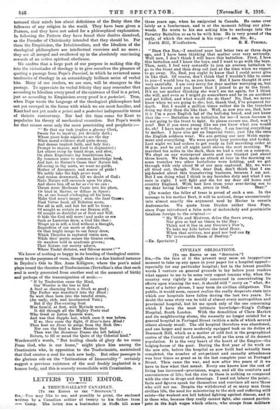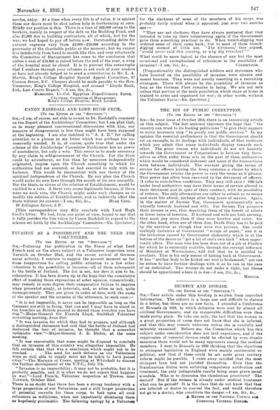CIVILIAN OBLIGATIONS.
[To THE EDITOR or TEE "SPECTATOR.") Sne,—On the face of it the present may seem an inopportune moment to take up any space in your paper for a hospital appeal— especially for any particular hospital; but in the fewest possible words I venture on general grounds to lay before your readers what appear to me to be some very cogent reasons why, when the country very rightly is mainly concerned in concentrating its efforts upon winning the war, it should still " carry on " what, 91..r want of a better phrase, I may term its civilian obligations. The public, it would seem, cannot realize the really desperate state into which our hospitals have fallen during the last two years. No doubt the same story can be told of almost every metropolitan and provincial hospital, but let me speak only of the one concerning which I have the most intimate knowledge—King's College Hospital, South London. With the demolition of Clare Market and its neighbouring slums, the necessity no longer existed for a general hospital in Portugal Street (within a mile of which several others already stood). The old hospital therefore was abandoned, and one larger and more modernly equipped took on its duties at Denmark Hill, which as a matter of cold fact is the geographical centre of the County of London, as well as the area of its densest population. It is the very heart of the heart of the Empire—the lodging-house of the poor. During the first year of its work on the new site, before the hospital as now built had actually been completed, the number of out-patient and casualty attendances was four times as great as in the last complete year at Portugal Street. Then came the war, and now after two years of it we have to face what that meant. Every one knows how the cost of living has increased—provisions, wages, and all the comforts and conveniences of life; but the rise in these is nothing as compared with the rise in drugs and dressings. I need not labour the point; facts and figures speak for themselves and convince all save those who will not see. Despite the withdrawal of so many men from civilian life, the need for ministering to the sick and suffering still exists—the weakest are left behind fighting against disease, and it is these who, because they really cannot fight, also cannot partici- pate in the high wages which others, who escape from military
service, enjoy. At a time when every life is of value, it is against these our doors must be shut unless help is forthcoming at once. Briefly our position is this. There is a loan of £60,000 owing to the bankers, mainly in respect of the debt on the Building Fund, and also £5,000 due to building contractors, all of which, but for the war, we had hoped to pay off before now. Outstanding debts for current expenses vary from 23,000—£10,000 according to the generosity of the charitable public at the moment; but we cannot live indefinitely from hand to month like this, and very reluctantly the Committee of Management has come to the conclusion that unless 'a sum of £20,000 is raised before the end of the year, a wing of the hospital must be closed. It is to prevent this catastrophe that I venture through your columns to ask such of your readers as have not already helped us to send a contribution to Mr. L. A. Martin, King's College Hospital Special Appeal Committee, 97 Cannon Street, E.C. Cheques should be made payable to the lion. Treasurer, King's College Hospital, and crossed " Lloyds Bank, Ltd., Law Courts Branch."—I am, Sir, &c.,
HAMBLEDEN, Lt.-Col. Egyptian Expeditionary Force, Chairman. Committee of Management.
King's College Hospital, South London.















































 Previous page
Previous page